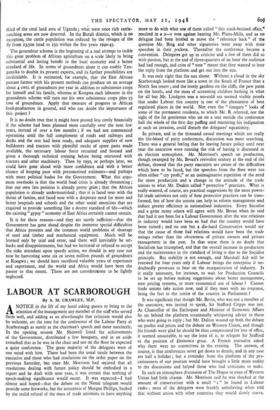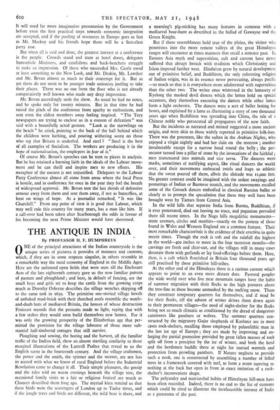LABOUR AT SCARBOROUGH
By A. M. CRAWLEY, M.P.
ANOTICE in the lift of my hotel asking guests to bring to the attention of the management any member of the staff who served them well, and adding as an afterthought that criticism would also be welcome, set the tone for the conference of the Labour Party at Scarborough as surely as the chairman's speech and more succinctly. In the opening session Mr. Shinwell listed the achievements of the Government, distributed a few bouquets, and in an aside remarked that as he was in the chair and not on the floor he expected a quiet conference. The great majority of the delegates were of one mind with him. There had been the usual tussle between the executive and those who had resolutions on the order paper on the previous Saturday, but once Mr. Morrison had secured • that all resolutions dealing with future policy should be embodied in a report and be dealt with next year, it was certain that nothing of epoch-making significance would occur. It was expected—I had almost said hoped—that the debate on the Nenni telegram would provide some fireworks, but the astuteness of Morgan Phillips, backed by the stolid refusal of the mass of trade unionists to have anything more to do with what one of them called " this crack-brained affair," resulted in a 2—I vote against hearing Mr. Platts-Mills, and as no delegate had been briefed to move the " reference back " of the question Mr, Bing and other signatories went away with their speeches in their pockets. Thereafter the conference became a convention. Delegates got up to criticise and a few of them did so with passion, but at the end of three-quarters of an hour the audience had had enough, and cries of " vote " meant that they wanted to hear the reply from the platform and get out into the sun.
It was only right that the sun shone. Without a cloud in the sky Scarborough looked more like a town in the South of France than a North Sea resort ; and the lovely gardens on the cliffs, the pew paint on the hotels, and the mass of screaming children bathing in what for all but Mr. Lindgren was a too-cold sea seemed visible proofs that under Labour this country is one of the pleasantest of best regulated places in the world. Not even the " vinegary " looks of some of the permanent residents, to which Mr. B. referred, nor the sight of the fat gentleman who sat on a seat outside the conference hall the whole of the first day puffing and muttering his indignation at such an invasion, could disturb the delegates' equanimity.
In private, and in the thousand casual meetings which are really the life-blood of party conferences, discussion was more searching. There was a general feeling that by leaving future policy until next year the executive were running the risk of having it discussed in an election atmosphere. Mr. Morrison's speech on production, though swamped by Mr. Bevan's revivalist oratory at the end of the debate, showed that the party executive are aware of the difficulties which have to be faced, but the speeches from the floor were too often either " cry profit," or an unimaginative repetition of the need for more production and a change in the attitude of the trade unions to what Mr. Deakin called "protective " practices. What is really wanted, of course, are practical suggestions by the most power- ful trade unionists not only of how protective practices can be trans- formed, but of how the unions can help to reform management and induce greater efficiency in nationalised industries. Every Socialist and a great many others will agree with Mr. Bevan when he said that had it not been for a Labour Government after the war relations in industry would have been so bad that the country would have been ruined ; and no one but a die-hard Conservative would say that the cause of those bad relations would have been the trade uniops rather than the obtuseness of private owners and private management in the past. In that sense there is no doubt that Socialism has triumphed, and that the overall increase in production and the maintenance in the standard of living is due to the Socialist principle. But stability is not enough, and Marshall Aid will be renewed for four years only if Labour brings the enterprise it un- doubtedly possesses to bear on the reorganisation of industry. Is it really necessary, for instance, to wait for Production Councils to be set up before making suggestions about better management, new pricing systems, or more economical use of labour ? Cannot trade unions take action now, and if they meet with no response, bring the fact to the notice of the country in Parliament ?
It was significant that though Mr. Bevin, who was not a member of the executive, was invited to speak, Sir Stafford Cripps was not. As Chancellor of the Exchequer and Minister of Economic Affairs he sat behind the platform occasionally whispering advice to those who were going to reply ; but Mr. Dalton wound up both the debate on profits and prices and the debate on Western Union, and though his friends were glad he should be thus compensated for loss of office, it seemed unsuitable, to say the least of it, to relegate Sir Stafford to the position of Eminence grise. A French journalist asked why there were no committees in the evening. The answer, of course, is that conferences never get down to details, and in any case are half a holiday ; but a reminder from the platform of the pre- cariousness of our position would have brought a little more reality to the discussions and helped those who had criticisms to make.
In such an atmosphere discussion of The Hague or even of Western Union had little chance. Mr. Morrison said he was shocked at the amount of conservatism with a small " c" he found in Labour ranks ; most of the delegates were frankly unbelieving when told that without union with other countries they would slowly starve. It will need far more imaginative presentation by the Government before even the first practical steps towards economic integration are accepted, and if the pooling of resources in Europe goes as fast as Mr. Mackay and his friends hope there will be a first-class party row.
But when all is said and done, the greatest interest at a conference is the people. Crowds stand and stare at hotel doors, delegates buttonhole Ministers, and candidates and back-benchers struggle to make an impression. Of those who succeeded Mrs. Castle owed at least something to the New Look, and Mr. Deakin, Mr. Lawther and Mr. Bevan almost as much to their contempt for it. But as yet there do not seem to be younger trade unionists. jostling to take their places. There was no one from the floor who is not already comparatively well known who made any deep impression.
Mr. Bevan accordingly stole the show. As usual he had no notes, and he spoke only for twenty minutes. But in that time he had raised the pitch of the conference from apathy to enthusiasm, and sent even the oldest members away feeling inspired. "The Tory newspapers are trying to enclose us in a cocoon of defeatism" was said with a beautifully acted gesture. " Look at the starvelings on the beach " he cried, pointing to the back of the hall behind which the children were bathing, and pouring withering scorn on those who say that Britain is underfed. And steel ? " Steel is the best of all examples of Socialism. The workers are producing it in the hope of nationalisation, the employers in fear of it."
Of course Mr. Bevan's speeches can be torn, to pieces in analysis. But he has retained a burning faith in the ideals of the Labour move- ment and he can thrill and inspire men to new efforts. His metaphor of the cocoon is not unjustified. Delegates to the Labour Party Conference almost all come from areas where the local Press is hostile, and in conference for once in the year they feel the breath of widespread approval. Mr. Bevan tore the last shreds of defensive armour away from them and sent them away, if not as butterflies, at least on wings of hope. As a journalist remarked, " It was like Churchill." From any point of view it is good that Labour, which may well rule this country for many years, has a man like him. If a call-over had been taken after Scarborough the odds in favour of his becoming the next Prime Minister would have shortened.



































 Previous page
Previous page